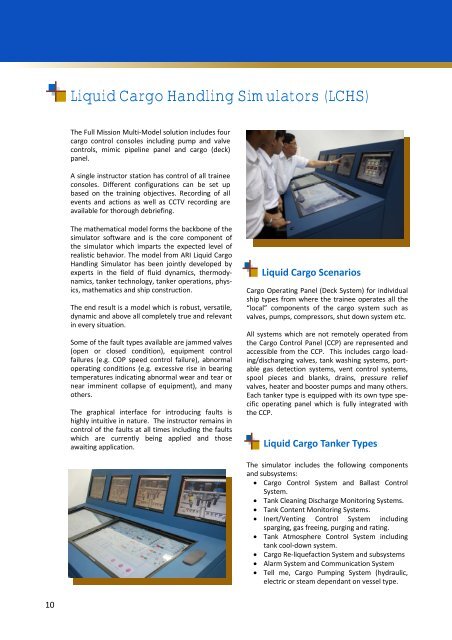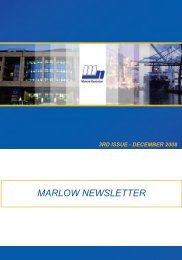+632 2588-2599 Email : marlow@marlow.com.cy Website
+632 2588-2599 Email : marlow@marlow.com.cy Website
+632 2588-2599 Email : marlow@marlow.com.cy Website
Create successful ePaper yourself
Turn your PDF publications into a flip-book with our unique Google optimized e-Paper software.
10<br />
Liquid Cargo Handling Simulators (LCHS)<br />
The Full Mission Multi‐Model solution includes four<br />
cargo control consoles including pump and valve<br />
controls, mimic pipeline panel and cargo (deck)<br />
panel.<br />
A single instructor station has control of all trainee<br />
consoles. Different configurations can be set up<br />
based on the training objectives. Recording of all<br />
events and actions as well as CCTV recording are<br />
available for thorough debriefing.<br />
The mathematical model forms the backbone of the<br />
simulator software and is the core <strong>com</strong>ponent of<br />
the simulator which imparts the expected level of<br />
realistic behavior. The model from ARI Liquid Cargo<br />
Handling Simulator has been jointly developed by<br />
experts in the field of fluid dynamics, thermody‐<br />
namics, tanker technology, tanker operations, phys‐<br />
ics, mathematics and ship construction.<br />
The end result is a model which is robust, versatile,<br />
dynamic and above all <strong>com</strong>pletely true and relevant<br />
in every situation.<br />
Some of the fault types available are jammed valves<br />
(open or closed condition), equipment control<br />
failures (e.g. COP speed control failure), abnormal<br />
operating conditions (e.g. excessive rise in bearing<br />
temperatures indicating abnormal wear and tear or<br />
near imminent collapse of equipment), and many<br />
others.<br />
The graphical interface for introducing faults is<br />
highly intuitive in nature. The instructor remains in<br />
control of the faults at all times including the faults<br />
which are currently being applied and those<br />
awaiting application.<br />
Liquid Cargo Scenarios<br />
Cargo Operating Panel (Deck System) for individual<br />
ship types from where the trainee operates all the<br />
“local” <strong>com</strong>ponents of the cargo system such as<br />
valves, pumps, <strong>com</strong>pressors, shut down system etc.<br />
All systems which are not remotely operated from<br />
the Cargo Control Panel (CCP) are represented and<br />
accessible from the CCP. This includes cargo load‐<br />
ing/discharging valves, tank washing systems, port‐<br />
able gas detection systems, vent control systems,<br />
spool pieces and blanks, drains, pressure relief<br />
valves, heater and booster pumps and many others.<br />
Each tanker type is equipped with its own type spe‐<br />
cific operating panel which is fully integrated with<br />
the CCP.<br />
Liquid Cargo Tanker Types<br />
The simulator includes the following <strong>com</strong>ponents<br />
and subsystems:<br />
• Cargo Control System and Ballast Control<br />
System.<br />
• Tank Cleaning Discharge Monitoring Systems.<br />
• Tank Content Monitoring Systems.<br />
• Inert/Venting Control System including<br />
sparging, gas freeing, purging and rating.<br />
• Tank Atmosphere Control System including<br />
tank cool‐down system.<br />
• Cargo Re‐liquefaction System and subsystems<br />
• Alarm System and Communication System<br />
• Tell me, Cargo Pumping System (hydraulic,<br />
electric or steam dependant on vessel type.



